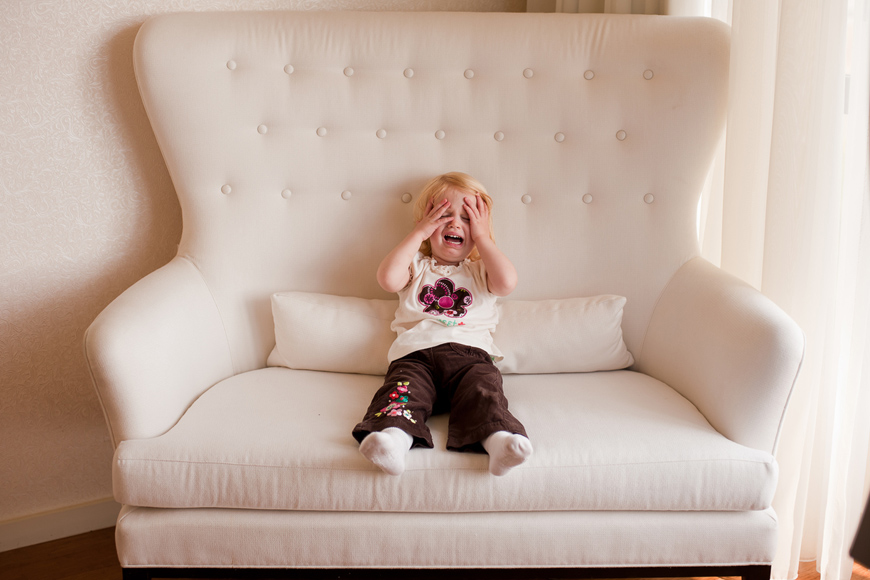A Survival Guide on Coping with the Terrible Twos
It can be a difficult time for parents to navigate, so here's some advice
31 July 2013
Editor

No one looks forward to the terrible twos, a developmental stage that usually begins sometime in the toddler years.
Although many parents don't expect the terrible twos to start until their toddler is two years old, it can strike as early as 18 months and as late as 30 months (and because it’s less an age thing, than a stage of development, you may be dealing with it when you least expect it).
If your child has been cooperative up until now, it may come as a shock, that your compliant little person becomes a ‘free thinker’, and challenges you in a variety of ways… On a daily basis.
They're experiencing lots of changes
While the terrible twos can be difficult for parents and caregivers to navigate, keep in mind that 2-year-olds are undergoing major motor, intellectual, social and emotional changes.
The terrible twos typically occur when toddlers begin to struggle between their reliance on adults and their desire for independence. Their vocabularies are growing, they're eager to do things on their own, and they're beginning to discover that they're expected to follow certain rules.
Look for new signs of assertiveness from your toddler, because most 2-year-olds still aren't able to move as swiftly as they'd like, or clearly communicate their needs or control their feelings. this can lead to frustration and misbehaviour — in other words, the terrible twos.
Characterised by toddlers being negative about most things and often saying 'no', the terrible twos may also find your toddler having frequent mood changes. He may insist on doing exactly what you've told him to do or not to do, or throw himself down on the floor in a fit of temper if he doesn't get his way.
This can also be the reason why your toddler frequently gets frustrated and resorts to hitting, biting, and temper tantrums when he doesn't get his way. His demands may alternately frustrate and amuse you. At times, for example, he'll likely ask for something that he doesn't even want, just to see if he has enough power to get it.
How parents can cope with this stage
To help you cope with this normal stage in your child's development, you should always remember that your child isn't trying to be defiant or rebellious on purpose, he is just trying to express his growing independence and doesn't have the language skills to easily express his needs.
By learning more about this normal stage in your child's development, can make it easier to get through it and make sure that you aren't contributing to more battles than are necessary.
Though you may be tempted to cry and throw yourself on the floor too, the best thing to do during a temper episode is keep your cool, sometimes all that is required from you is to give him a hug and a few minutes of your undivided attention, sometimes he may benefit from the distraction technique — offer him another activity or toy.
Expect that you'll occasionally lose patience with each other... It can often be as frustrating for your child, as it is for you. So here's some other useful pieces of advice that could help you to cope with this phase:

Introduce time-out, and advice for when you're out the home
Begin to use time-out and taking away privileges as discipline techniques, but remember time out has to be ‘age appropriate’, three whole minutes is a long time for a two year old, the fact that having to sit on the stair, or sofa or wherever you choose, is consequence enough in most cases, and can soon be a deterrent, but you must be prepared to enforce it, it, and sit him back down if he wants leave before the time is up.
The use of a kitchen timer is a great tool. Press stop, if you have to sit him back down, and press start again once he is there.
If you're in a public place or at someone's house, pick him up and take him someplace where the two of you can sit calmly until the behaviour subsides. You can be pretty sure you’ll be able to outwit a two-year-old. So even if you’re not entirely clear about what’s troubling him you have a great shot at distracting him.
You must be consistent, two year olds are clever, and will soon cotton on that if he holds out, you will give in. So say what you mean, and follow through.
Remember to reward and praise good behaviour. This is really important, your little child will begin understand what makes you happy!

























.png?itok=SvZPqMHH)




.png?itok=uB2ieOR7)












